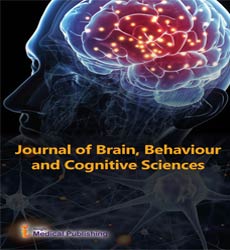Description about Journal of Brain Behaviour and Cognitive Sciences
Lakshmi N Yatham*
1Department of Neuroscience, University of Montreal, Quebec, Canada
- *Corresponding Author:
- Lakshmi N Yatham
- Department of Neuroscience, University of Montreal, Quebec, Canada,
- Tel: 617 726 7237
- E-mail: yatham12@mail.ubc.ca
Received Date: July 07, 2021; Accepted Date: July 22, 2021; Published Date: July 29, 2021
Citation: Yatham LN (2021) Description about Journal of Brain Behaviour and Cognitive Sciences. J Brain Behav Cogn Sci Vol.4 No.4:e002
Editorial Note
Journal of Brain, Behaviour and Cognitive Sciences is peer reviewed open access journal in which we can access articles related to brain, behaviour and cognitive sciences without any charge. This publisher of this journal is imedpub. There are 30+ Million website visitors. Journal of brain, behaviour and cognitive sciences provides information related to brain, behaviour and cognitive sciences to researcher and publish articles related to brain, behaviour functions, disorders, and treatment. Journal of brain, behaviour and cognitive sciences accept quality articles: case reports, editorials, review articles, short communication, mini review, original research articles etc. related to brain behaviour functions, disorders, and treatment. The journal's major goal is to advance the scientific community globally by publishing high-quality papers on brain, behaviour diseases, functions, and stroke. Original research papers, early reports, review articles, editorials, and correspondence on the topics of brain, behaviour and cognitive science are suitable.
Authors can also contribute articles that are relevant to the subject matter:
Neuropharmacology: The study of how medicines impact cellular activity in the nervous system, as well as the neurological pathways by which they influence behaviour, is known as neuropharmacology. Behavioural and molecular neuropharmacology are the two primary areas of neuropharmacology.
Cognitive ageing: The decline in cognitive performance that happens as people age is known as cognitive ageing. Vocabulary deficits, for example, are unavoidable as the brain aging and may even improve with time. Other capabilities, such as mental reasoning, memory, and processing speed, progressively deteriorate with age. A better knowledge of normal brain ageing might help researchers better comprehend aberrant brain functions.
Neuroimaging: The process of directly or indirectly evaluating the structure, function, and pharmacology of the nervous system is known as neuroimaging or brain imaging. Within medicine, neurology, and psychology, it is a fairly young topic.
Cognitive psychology: The topic of cognitive psychology focuses on how humans process information such as attention, language usage, memory, perception, problem solving, creativity, and thinking. The contemporary study of cognition is based on the idea that the brain may be seen as a sophisticated computer system.
Alzheimer's disease: Alzheimer's disease is a progressive neurodegenerative illness that impairs several brain processes. It is the most typical form of dementia. 60 to 80 percent of dementia problems are caused by Alzheimer's disease. Over the course of several years, Alzheimer's symptoms grow gradually and become more severe.
Artificial Intelligence: AI stands for Artificial Intelligence. Artificial Intelligence is a specialized branch of computer research that entails the processing and synthesis of numerous analytical and logical answers with the effective input from the system itself, which is equivalent to human intelligence.
Neurophysiology: Neurophysiology is a field of physiology and neuroscience that studies the nervous system's function utilising electrophysiological recordings and molecular biology techniques. Electrophysiological recordings can aid in the identification of neurological disorders including epilepsy and neuropathies.
I would like to thank all of the authors, reviewers, and other supporter groups for their contributions to the final editing of the published articles, as well as the editorial assistant's help in resolving journal of brain, behaviour and cognitive sciences concerns in a timely manner. I am very grateful to all authors, reviewer and supporter groups for encouraging me to appreciate the work and progress of other organizations that enable me to publish articles effectively.
Open Access Journals
- Aquaculture & Veterinary Science
- Chemistry & Chemical Sciences
- Clinical Sciences
- Engineering
- General Science
- Genetics & Molecular Biology
- Health Care & Nursing
- Immunology & Microbiology
- Materials Science
- Mathematics & Physics
- Medical Sciences
- Neurology & Psychiatry
- Oncology & Cancer Science
- Pharmaceutical Sciences
